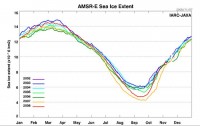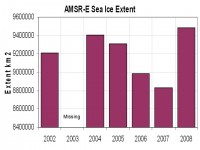Joe D’Aleo, AMS Fellow
The latest daily arctic sea ice extent chart from IJIS shows the current year ice extent at the highest level in the record back to 2002. (2003 was missing).
 See larger image here
See larger image here
The daily extents on November 7 look like this:

See larger image here
This represents an increase of 655,781 square kilometers over last November 7 or 7.4%. Side-by-side images from the Cryosphere show there is more ice on both the Pacific and Atlantic side this year. This is 44 days before the start of the Northern Hemisphere winter and 5 months before it will peak.

See larger image here
See pdf here.
By Kenneth P. Green
It would indeed create jobs, but it would do so by killing other jobs. Is that really what Americans want?
President-elect Barack Obama has put energy policy at the forefront of his agenda. He says that his plan will boost our national security, help us achieve “energy independence,” reduce greenhouse gas emissions, and promote job creation. Indeed, Obama vows to create around five million new jobs by increasing federal spending on renewable energy sources such as wind, solar, and biofuels.
As many experts have observed, the science behind the Obama plan is dubious, particularly when it comes to ethanol. The renewable energy industry simply does not have the capacity (at least not yet) to power large swathes of our fossil fuel-driven economy. Just look at the United Kingdom, where a shortage of windmill-building capability has hindered the government’s plan to replace aging nuclear reactors with wind power.
If Obama’s energy promises rely on questionable science, they rely on even more questionable economics. We are to believe that replacing conventional energy sources (especially coal) with renewables (especially wind) will create five million new “green jobs.” The hope is that armies of workers will be enlisted to build tens of thousands of windmills; to manufacture and deploy solar-power installations; to harvest, transport, and process huge amounts of biofuel feedstock; and to string the power lines that will allow the U.S. power grid to incorporate a major expansion of intermittent energy.
Unfortunately, the idea of government “job creation” is a classic example of the broken window fallacy, which was explained by French economist Frederic Bastiat way back in 1850. Read more about this here.
The Obama plan reflects fallacious thinking of the first order. There may be sound reasons to switch from existing energy sources to renewables, including the need to slash greenhouse gas emissions, the need to reduce our dependence on Middle Eastern oil, and the need to meet growing energy demand. If Americans wish to pay for a wholesale transformation of the energy industry, that is their choice. But let’s not lie about the costs, and let’s not espouse an economic fallacy that is nearly 160 years old. Obama’s “green jobs” plan would indeed create jobs, but it would do so by killing other jobs. Is that really the type of energy policy Americans want?
Global concern about the ailing economy has led the European Environment Committee to revise its energy package. The committee announced that it agreed the European Union should revise key clauses in its climate and energy package to adjust for the current financial crisis. The economic slowdown has hurt carbon credit demand and pricing.
Over the past few weeks EU member states have requested permission to make some revisions to protect their economies. Bulgaria, Estonia, the Czech Republic, Hungary, Latvia, Lithuania, Romania, Slovakia and Poland have criticized the proposed shift to a pan-European carbon credit auctioning mechanism and have gotten the support of France, Germany and Spain in their efforts to change the planned trading mechanism. See more here.
As Carl Mortished noted in the Australian, The price of carbon has collapsed. In only three months, life has become a lot cheaper for polluters. The financial cost of warming the planet has plummeted in Europe’s emissions trading system (ETS) and the effectiveness of such a volatile market mechanism in curbing carbon is being questioned. You may recall that the ETS is a mechanism to encourage businesses to reduce their carbon output. Europe’s larger companies are allocated permits to emit CO2, and these allowances, called EUAs, can be traded on exchanges. Companies that emit less CO2 than their allocation can sell EUAs for cash, but inefficient polluters must buy EUAs or face financial penalties. Carbon’s falling price spells companies going bust, the loss of jobs and the shredding of political reputations. Over the next year, no politician with re-election hopes will back a policy that would triple the price of carbon for industry and raise consumers’ energy costs. There is a wider question about the ETS that must be addressed, and that is whether it is a sensible mechanism to regulate carbon.
Finally, as David Fogarty, Climate Change Correspondent, Asia for Reuters reports here, U.S. President-elect Barack Obama’s credentials may be green, but gathering financial gloom means fixing the economy will take priority on his agenda before dealing with national carbon trading and clean-energy investment. Analysts and carbon brokers believe Obama’s support for an emissions cap-and-trade scheme and plans to create millions of “green” industry jobs send exactly the right signal for carbon trading and the burgeoning renewable energy industry. But don’t expect miracles overnight, they said. Depleted government coffers, rising unemployment and plunging profits across most industries could prevent him from making sweeping changes in his crucial first year. “We’re guessing until he goes and checks his bank account and finds out how much in debt he is,” said Michael Hopkins, energy derivatives manager at TFS Energy Asia-Pacific, referring to the hundreds of billions of dollars pledged by the Bush administration to stabilize the financial markets.
Pushing through a national emissions trading scheme won’t be the top item on Obama’s hit-list, Hopkins said in Singapore. “I think he has other issues to deal with before tackling the environmental side of it,” he added.


